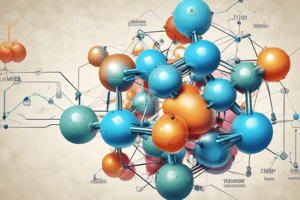Podcast
Questions and Answers
What is the main focus of chemistry?
What is the main focus of chemistry?
- Investigating the human brain
- Studying how atoms bond to form molecules and compounds (correct)
- Exploring the solar system
- Understanding how plants grow
What determines how an atom will behave when bonded with others?
What determines how an atom will behave when bonded with others?
- Electrons (correct)
- Molecules
- Neutrons
- Protons
What is the function of protons in an atom?
What is the function of protons in an atom?
- Control the atom's color
- Form bonds with other atoms
- Give the atom its charge (correct)
- Determine the behavior of the atom
What is molecular structure?
What is molecular structure?
Which type of bond characterizes inorganic materials like table salt (NaCl) and water (H₂O)?
Which type of bond characterizes inorganic materials like table salt (NaCl) and water (H₂O)?
Which type of reaction involves the formation of new substances?
Which type of reaction involves the formation of new substances?
What is a critical component of chemical study related to how fast reactants turn into products?
What is a critical component of chemical study related to how fast reactants turn into products?
Which field benefits from the advancements made by chemists in drugs, diagnostic tests, and prosthetics?
Which field benefits from the advancements made by chemists in drugs, diagnostic tests, and prosthetics?
What technology relies heavily on developments in chemistry for its advancement?
What technology relies heavily on developments in chemistry for its advancement?
Which aspect of chemistry aims to reduce humanity's ecological footprint?
Which aspect of chemistry aims to reduce humanity's ecological footprint?
Study Notes
Exploring Science: A Deeper Dive into Chemistry
Chemistry is one of those fascinating branches of science where understanding the fundamental properties of matter can unlock innovation, improve our lives, and even reveal secrets hidden within nature itself. As we set out to explore this intriguing field, let's delve deeper into some key concepts and applications of chemistry.
What Is Chemistry?
In its simplest terms, chemistry involves studying how atoms bond with each other to form molecules and compounds, how these molecules interact with their environment, and what unique characteristics result from such interactions. This knowledge has led us to discover elements like oxygen and carbon dioxide essential for life on Earth and develop processes like photosynthesis that power ecosystems.
Atoms and Molecular Structure
At the heart of all chemical reactions lie atoms—the building blocks of our physical world. Each element contains specific types of atoms with distinct numbers of protons and neutrons in their nuclei. Protons give every atom its charge, while electrons determine how it will behave when bonded together with others.
Molecular structure describes the arrangement of atoms within a substance or compound. In organic chemistry, this often takes the shape of complex chains and rings, whereas ionic bonds characterize inorganic materials like table salt (NaCl) and water (H₂O).
Reaction Types and Energy Changes
When matter interacts chemically, new substances may form through various reaction types including synthesis (formation), decomposition, neutralization, single displacement, double displacement, combustion, oxidation–reduction, acid–base, precipitation, and solubility changes. These processes release or require energy, which scientists measure using heat, temperature, gas pressure, and electricity. Understanding reaction kinetics —how fast reactants turn into products—is another critical component of chemical study.
Applications of Chemistry
The science of chemistry affects virtually every aspect of modern society. From everyday goods like soap and toothpaste to advanced technologies such as lithium batteries and pharmaceuticals, chemistry makes a tangible impact on daily living standards worldwide.
Some notable examples of chemistry's practical uses include:
- Agriculture and food production: Synthetic fertilizers, pesticides, herbicides, and artificial sweeteners have revolutionized farming methods.
- Medicine and healthcare: Drugs, diagnostic tests, medical imagery, and prosthetics would not exist without the advancements made by chemists throughout history.
- Energy storage: Batteries, fuel cells, solar panels, and hydrogen fuel technology rely heavily on developments in chemistry.
- Materials science: Advanced polymers, composites, ceramics, semiconductors, and nanomaterials push the boundaries of what once seemed impossible.
- Environmental protection: Air pollution control systems, waste management solutions, and renewable resources technologies aim to reduce humanity's ecological footprint.
- Forensic analysis: Crime scene investigations utilize analytical techniques like chromatography, mass spectrometry, and spectroscopy to solve crimes.
As you can see, there's much more to chemistry than meets the eye. With so many fascinating facets to explore, donning your lab coat and conducting experiments might just become your next favorite pastime!
Studying That Suits You
Use AI to generate personalized quizzes and flashcards to suit your learning preferences.
Description
Delve into the fascinating world of chemistry by exploring key concepts like atoms, molecular structure, reaction types, and energy changes, as well as practical applications in various fields such as agriculture, medicine, energy storage, materials science, environmental protection, and forensic analysis.




